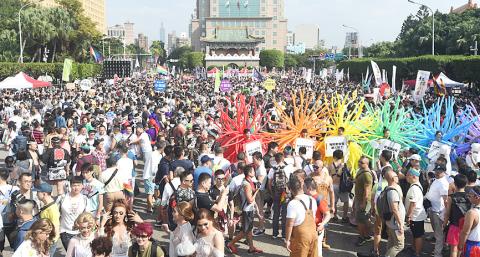A total of 157 same-sex couples plan to register to get married at household registration offices on May 24, the day the Council of Grand Justices set for same-sex marriages to be legalized, the Taiwan Alliance to Promote Civil Partnership Rights said in a recent Facebook post.
To mark the historic day, the LGBTI rights organization also plans to arrange a traditional wedding banquet outside the Presidential Office Building in Taipei on May 25.
Writer Chen Hsueh (陳雪) and her partner plan to be among the couples registering to get married that day.

Photo: Liao Chen-huei, Taipei Times
The registration and wedding plans are going ahead, despite uncertainty over how the Legislative Yuan plans to handle competing demands from groups in favor of legalizing same-sex marriage and those opposed to categorizing same-sex unions as marriages.
On May 24, 2017, the Council of Grand Justice ruled that the prohibition of same-sex marriage in the Civil Code was unconstitutional and that within two years, the relevant authorities must amend or enact laws in accordance with Judicial Yuan Interpretation No. 748.
However, a referendum on whether to support the legalization of same-sex marriage through amendments to the Civil Code was defeated in November last year.
When asked: “Do you agree that the right to marriage of persons of the same sex should be protected by legislation under the chapter on marriage of the Civil Code?” 6,949,697 Taiwanese voted against the initiative, while 3,382,286 voted in favor of it.
Nonetheless, the Legislative Yuan on March 5 voted to send the “enforcement act of Judicial Yuan Interpretation No. 748” to a second reading.
It is the first draft act created using the name of the constitutional interpretation, which would allow same-sex couples to register their marriage or divorce at any household registration office.
To appease those who oppose treating same-sex unions as marriages, the Legislative Yuan on March 15 also voted to send another draft bill, which would limit the use of the words “marriage” and “spouse” to heterosexual couples, to a second reading.
It was drafted in response to the passing of Referendum No. 12, which asked: “Do you agree that the right to persons of the same sex to create a permanent union should be guaranteed by an institution other than marriage as defined by the Civil Code?”
As it is less than one month before May 24, the alliance on Thursday issued a statement saying that the “enforcement act of Referendum No. 12” diverges from the council’s 2017 ruling.
Marriage Equality Coalition Taiwan in a news release on Friday urged lawmakers to pass “enforcement act of Judicial Yuan Interpretation No. 748” before May 24, so that same-sex couples can marry legally.
The Coalition for the Happiness of Our Next Generation, a conservative group, on Friday held a news conference, calling on legislators to stick to the results of last year’s referendum and support the “enforcement act of Referendum No. 12.”
Draft acts have to pass second and third readings by the full Legislative Yuan before becoming laws.
It is unclear what would happen if the legislature passes both drafts.

A preclearance service to facilitate entry for people traveling to select airports in Japan would be available from Thursday next week to Feb. 25 at Taiwan Taoyuan International Airport, Taoyuan International Airport Corp (TIAC) said on Tuesday. The service was first made available to Taiwanese travelers throughout the winter vacation of 2024 and during the Lunar New Year holiday. In addition to flights to the Japanese cities of Hakodate, Asahikawa, Akita, Sendai, Niigata, Okayama, Takamatsu, Kumamoto and Kagoshima, the service would be available to travelers to Kobe and Oita. The service can be accessed by passengers of 15 flight routes operated by

Alain Robert, known as the "French Spider-Man," praised Alex Honnold as exceptionally well-prepared after the US climber completed a free solo ascent of Taipei 101 yesterday. Robert said Honnold's ascent of the 508m-tall skyscraper in just more than one-and-a-half hours without using safety ropes or equipment was a remarkable achievement. "This is my life," he said in an interview conducted in French, adding that he liked the feeling of being "on the edge of danger." The 63-year-old Frenchman climbed Taipei 101 using ropes in December 2004, taking about four hours to reach the top. On a one-to-10 scale of difficulty, Robert said Taipei 101

MORE FALL: An investigation into one of Xi’s key cronies, part of a broader ‘anti-corruption’ drive, indicates that he might have a deep distrust in the military, an expert said China’s latest military purge underscores systemic risks in its shift from collective leadership to sole rule under Chinese President Xi Jinping (習近平), and could disrupt its chain of command and military capabilities, a national security official said yesterday. If decisionmaking within the Chinese Communist Party has become “irrational” under one-man rule, the Taiwan Strait and the regional situation must be approached with extreme caution, given unforeseen risks, they added. The anonymous official made the remarks as China’s Central Military Commission Vice Chairman Zhang Youxia (張又俠) and Joint Staff Department Chief of Staff Liu Zhenli (劉振立) were reportedly being investigated for suspected “serious

Taiwanese and US defense groups are collaborating to introduce deployable, semi-autonomous manufacturing systems for drones and components in a boost to the nation’s supply chain resilience. Taiwan’s G-Tech Optroelectronics Corp subsidiary GTOC and the US’ Aerkomm Inc on Friday announced an agreement with fellow US-based Firestorm Lab to adopt the latter’s xCell, a technology featuring 3D printers fitted in 6.1m container units. The systems enable aerial platforms and parts to be produced in high volumes from dispersed nodes capable of rapid redeployment, to minimize the risk of enemy strikes and to meet field requirements, they said. Firestorm chief technology officer Ian Muceus said